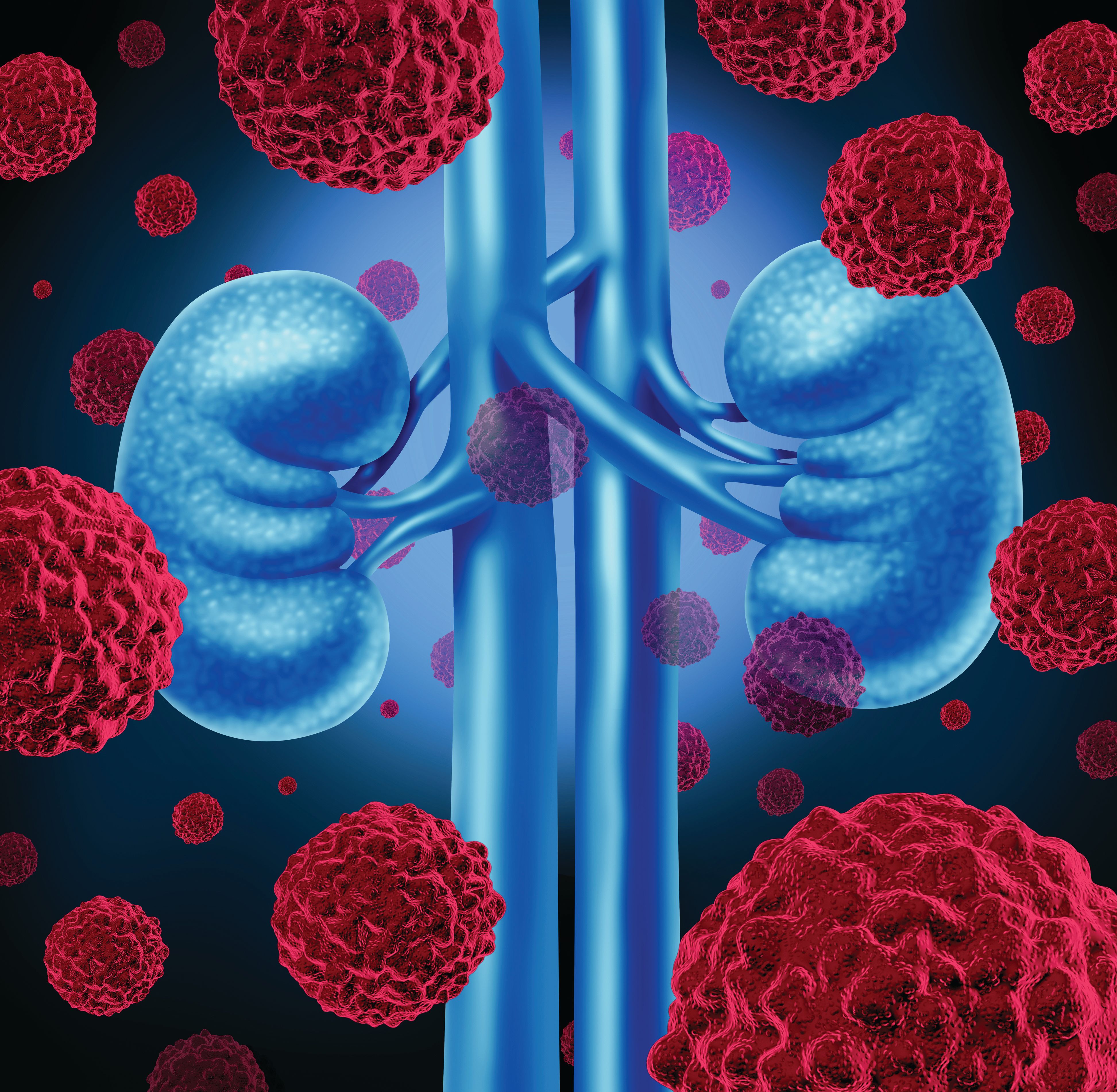Neoadjuvant Axitinib May Enable Partial Nephrectomy in Subgroup of Patients with RCC
Neoadjuvant axitnib demonstrated significant reductions in tumor size and complexity, allowing for partial nephrectomy in a subgroup of patients with renal cell carcinoma.

Partial nephrectomy and complex masses with an imperative indication for nephron-sparing surgery enabled with the use of neoadjuvant axitinib (Inlyta) in patients with clear cell renal cell carcinoma (RCC) who have complex renal masses, acceptable safety, and functional preservation. However, no viable pathway to receive the procedure, according to interim results from the phase 2 PADRES trial (NCT03438708) presented at the 2022 AUA annual meeting.1
Explaining the background of the study, lead author Kevin Hakimi, a medical student at the UC San Diego School of Medicine, said, “Up to 25% of patients presenting with renal masses have renal insufficiency or other imperative indications for nephron-conserving management. Further, although partial nephrectomy is increasingly pursued in patients with large or complex masses, a subgroup of patients with imperative indication may not initially have masses that are amenable for partial nephrectomy.”
Accordingly, Hakimiet al launched the single-arm PADRES trial to determine whether neoadjuvant therapy with the TKI axitinib could cytoreduce renal tumors and enable patients with an imperative indication to receive a partial nephrectomy.
There were 26 patients enrolled in the study, with a median age of 69.5 years. Patients had biopsy-confirmed clear cell RCC strongly indicated for partial nephrectomy with the potential for dialysis dependence if given radical nephrectomy. All patients had complex renal masses, which the study defined as a RENAL Nephrometry score in the high range of 10 to 12 and a tumor stage of cT1b to cT3M0.
There were 14 males and 12 females. The ECOG performance status was 0 for nine patients, 1 for fifteen patients, and 2 for two patients.
Patients received oral axitinib at 5 mg twice daily for 8 weeks prior to nephrectomy. The primary end point of the trial was reduction in longest tumor diameter as determined by imaging criteria. Secondary outcome measures included tumor response per RESIST criteria, feasibility of partial nephrectomy, change in RENAL Nephrometry score, survival outcomes, and post-surgical complications.
At a median follow-up of 12 months, the median reduction in tumor size was 19% (P <.001), with a median size of 7.7 cm prior to axitinib treatment and 6.3 cm after. Axitinib also led to a significant reduction in median RENAL Nephrometry score from 11 to 10 (P <.001). There were 9 patients (34.6%) who had a partial response per RECIST criteria and the remaining 17 patients had stable disease.
The specific tumor staging pre- vs post-axitinib was as follows: T1a, 0 vs 5 patients, respectively; T1b, 4 vs 3 patients; T2a, 2 vs 0 patients; T3a, 17 patients each; T3b, 3 vs 1 patient.
“Twenty patients initially presented with T3a/T3b disease and 9 patients were downstaged,” said Hakimi.
Regarding the safety of pre-operative axitinib, Hakimi said that 5 patients experienced grade 3 adverse events related to the treatment, consisting of hypertension (n = 3), fatigue (n = 1), and weigh loss (n = 1).
Surgical outcomes showed that 25 patients were able to complete nephrectomy, comprising 19 partial nephrectomies and 6 radical nephrectomies. Twenty four (92.3%) of the patients had negative margins. There were 6 patients who had grade 3/4 post-operative complications.
Hakimi also noted that, importantly, “Patients who underwent partial nephrectomy had preserved renal function.”
Regarding next steps, he said the PADRES trial “continues to accrue with an end goal of 50 patients.”
Reference
1. Hakimi K, Campbell S, Nguyen M, et al. Interim analysis of PADRES (prior axitinib as a determinant of outcome of renal surgery nct03438708) clinical trial. Presented during 2022 AUA Annual Meeting; New Orleans, LA. Abstract LBA01-08.
Enhancing Precision in Immunotherapy: CD8 PET-Avidity in RCC
March 1st 2024In this episode of Emerging Experts, Peter Zang, MD, highlights research on baseline CD8 lymph node avidity with 89-Zr-crefmirlimab for the treatment of patients with metastatic renal cell carcinoma and response to immunotherapy.
Listen
Beyond the First-Line: Economides on Advancing Therapies in RCC
February 1st 2024In our 4th episode of Emerging Experts, Minas P. Economides, MD, unveils the challenges and opportunities for renal cell carcinoma treatment, focusing on the lack of therapies available in the second-line setting.
Listen
Peers Discuss Management of IO/TKI Toxicities and Dosing Strategies in Frontline RCC
March 11th 2025During a Case-Based Roundtable® event, Elizabeth M. Wulff-Burchfield, MD, and other participants discussed their experiences with the frontline combination regimens for advanced renal cell carcinoma.
Read More






